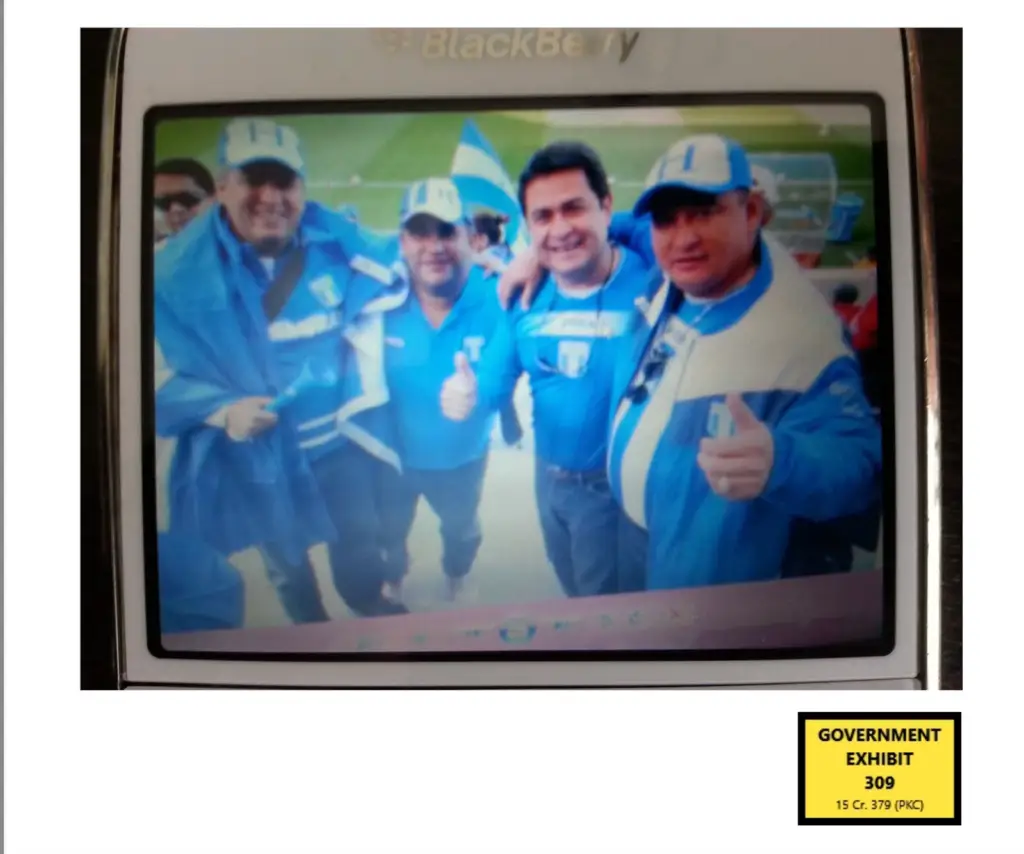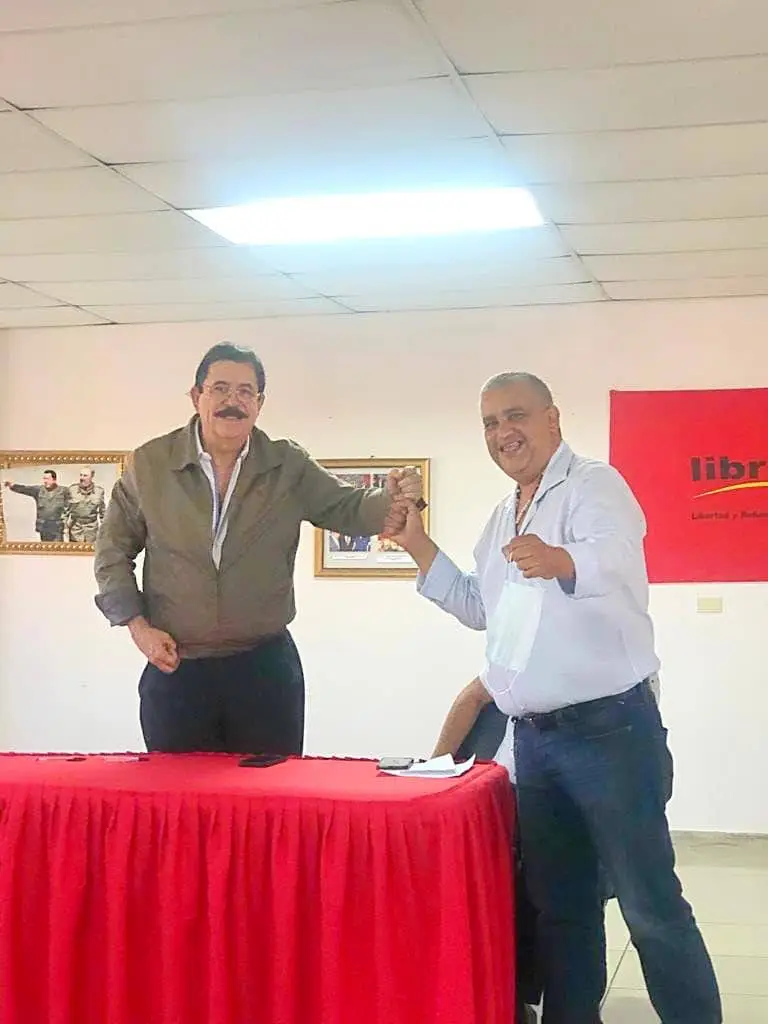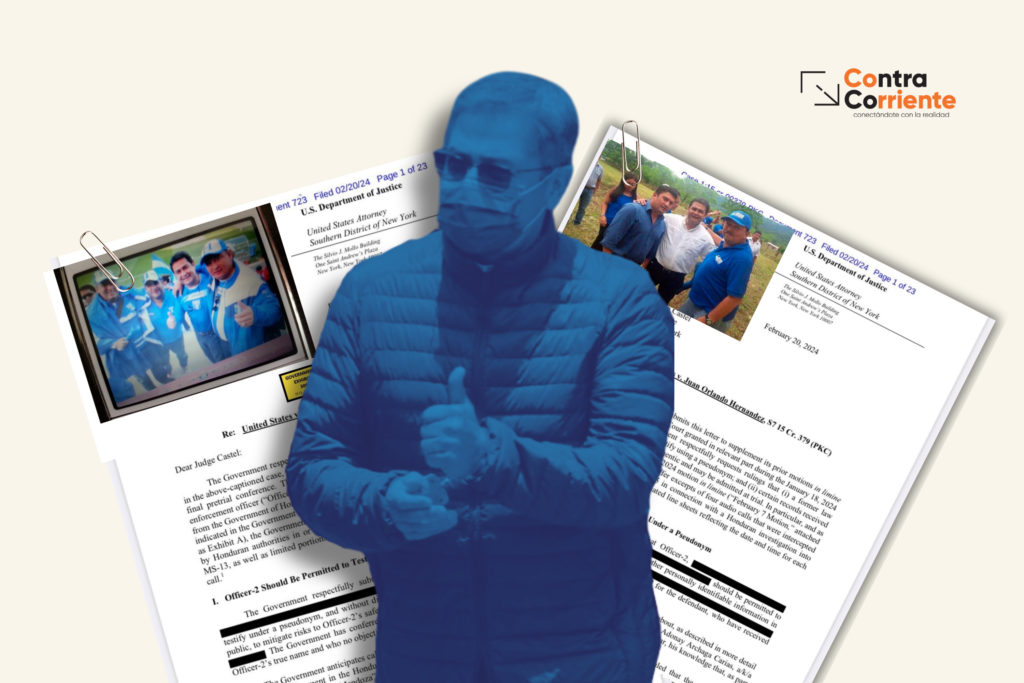Alexander Ardón Soriano, the ex-mayor of El Paraíso, Copán, played a pivotal role in initiating the trial against Juan Orlando Hernández. He admitted in court to acting as a mediator between Joaquín “El Chapo” Guzmán, head of the Sinaloa Cartel, and the former president, and confessed to financially supporting the latter’s campaign with over a million dollars. Additionally, Ardón detailed the mechanics of vote buying in Copán, implicating current deputies and mayors from the department.
Written by: Jennifer Ávila, Célia Pousset y Vienna Herrera
Cover: Catherine Calderón
Translation: Amy Patricia Morales
In 2010, Nationalist deputies from Copán were allegedly directed by Alexander Ardón, the former mayor of El Paraíso, Copán, to vote for Juan Orlando Hernández as president of the National Congress, in exchange for receiving funds tied to drug trafficking. This assertion came directly from Ardón Soriano himself, the second witness presented by the US Attorney’s Office for the Southern District of New York in the trial against former President Juan Orlando Hernández. Soriano aimed to clarify that during this period of co-governance, Porfirio Lobo Sosa served as president, while Juan Orlando Hernández solidified his ascent to power as president of the National Congress. Most importantly, Soriano shed light on various aspects of electoral fraud and the influence of drug cartels on politics.
Out of the four Nationalist deputies from Copán alleged to have followed Ardón’s instructions, only one remains alive. In Honduras, he faces accusations of misappropriating public funds and currently holds the position of mayor in Nueva Arcadia, Copán: José Vicente León Rojas.
Honduras is currently embroiled in one of its most significant trials in recent memory, that of former president Juan Orlando Hernández, who was fraudulently reelected and remained in power for two consecutive terms, now stands trial on three charges related to drug trafficking. The proceedings have unveiled a system of caudillismo and revealed intricate networks of drug money laundering facilitated through bribery and electoral fraud.
Amilcar Alexander Ardón Soriano, a key witness in this judicial proceedings, began his political career in 2005 in the Honduran-Guatemalan border region. Testifying under oath in the Southern District Court of New York, he admitted to gaining a political foothold by committing fraud, paying for votes and controlling polling stations with money he earned from drug trafficking.
Ardón has repeated the same testimony several times in different trials, and has been an effective collaborator for the accusations against Honduran politicians and drug traffickers in the United States since he turned himself in to US authorities in 2019. Since surrendering to US authorities in 2019, he has not only divulged details of his involvement in drug trafficking conflicts, including the transportation of cocaine to Guatemala for Joaquín “Chapo” Guzmán’s associates, but has also outlined his control over congressmen and fellow mayors during his tenure as the mayor of Copán. Ardón disclosed that this influence shielded him for an extended period. Furthermore, he managed to manipulate the Road Fund (now the Infrastructure and Transportation Secretariat) while his brother served as director, ensuring that roads were strategically opened to facilitate drug trafficking. Additionally, Ardón secured state contracts for his construction companies, facilitating the laundering of drug money.
As Ardón Soriano testified about bribing deputies, the municipality of Nueva Arcadia, Copán, overseen by former Nationalist deputy José Vicente León Rojas, shared on its Facebook page: “Today marks the beginning of the hydraulic concrete paving of a section of the street in the Dorado neighborhood boulevard. Progress continues with various projects that greatly benefit the residents of Nueva Arcadia municipality! José Vicente León Rojas is committed to working with integrity and transparency.”
In 2010, the year Ardón alleges he directed deputies in his department to vote for Juan Orlando Hernández as the president of that governmental branch, the National Party had four deputies in Copán: José Vicente León Rojas, Gustavo Adolfo Alvarado Alvarado, Juan de Jesús Madrid Deras, and Julio César Gámez Interiano. Unfortunately, three of them passed away. Madrid Deras was fatally shot in December 2010 in Copán Ruinas while delivering the Ten Thousand Bonus, and two months later, his brother met a similar fate. During cross-examination by JOH’s defense, Ardón Soriano denied any involvement in these murders. Gustavo Alvarado died of a heart attack in 2011, and Julio Gámez passed away in 2023, as per a National Party mourning agreement that does not specify the cause of death.
León Rojas is the only one alive and still politically active. Contracorriente attempted to contact him for a response to Ardón Soriano’s allegations, and to inquire about any potential funds he received from the narco-mayor of El Paraíso. We contacted him directly via his social networks and called the mayor’s office. As of this writing, we have not received a response.
In any case, the mayor’s “honesty and transparency” is questionable. León Rojas has an open criminal case in Honduras for being part of the diversion of almost 19 million lempiras from the National Congress, according to a prosecutorial request from the Specialized Prosecutorial Unit Against Corruption Networks (Uferco) filed on June 21, 2022.
The Uferco prosecutor, Luis Javier Santos, explained to Contracorriente the origins of the case: “We received a complaint that through two NGOs, five deputies were taking money. We investigated and realized that this gentleman had managed funds from these organizations and had been a beneficiary of these funds”.
Most of the funds left the National Congress between 2011 and 2018, and went through two NGOs, Community Leaders for Development (Olicode) and Impulso Solidario (Oimso). At this time, according to prosecutor Santos, the use of NGOs to siphon off public money was a “very famous modality that Honduran politicians copied from the Colombians.” He estimates that a total of 10 billion lempiras were looted through different NGOs.
“The deputies managed money through the President of the Republic, Juan Orlando Hernández, for projects in their departments. But once the projects were approved and the money was deposited in the accounts of the NGOs, the next day, the NGOs would deliver part of the funds to the deputies. There were several modalities: they delivered the money in cash, by checks made out to front men, or deposited it directly in their accounts. They would give 80% of the funds to the deputies and kept 20%. These were projects that left no traces, such as patching a road or fumigating the municipality. That is why, after a few months, it was very difficult to identify whether the project had been done or not. But we identified that the money was not spent on these projects, but ended up in the deputies’ accounts,” the prosecutor explained.
Moreover, the Uferco team discovered that signatures of individuals who were purportedly beneficiaries of social aid or involved in project execution had been falsified. These individuals confirmed that they had neither received nor participated in such activities.
The judge issued a formal indictment against Leon Rojas, but he was not suspended from his position as mayor of Nueva Arcadia.
Copán, cocaine corridor and land of caudillos
Despite attempts by the defense to undermine, distort, and portray Ardon’s narrative as untruthful, it sheds light on the political culture in Honduras and the government’s disregard for the most isolated regions, such as the border towns of Copan along the Guatemala border. In the western part of the country lies the Trifinio, the triple border of northern Central America, serving as a crucial route for migrants and the trafficking of coca.
Ardon, who had only completed fifth grade and struggled to spell his own name in front of the judge in the Southern District Court of New York, recounted how he entered the drug trade at the young age of 17 or 18. He admitted guilt in trafficking around 250 tons of cocaine to the United States, being involved in the deaths of 56 individuals, and using prohibited weapons like AK47s, AR15 rifles, bazookas, and semi-automatic firearms to safeguard his drug operations. However, the most important aspect of his testimony was his assertion that achieving such operations required political influence and agreements with at least two former Honduran presidents, namely Porfirio Lobo Sosa and Juan Orlando Hernandez. The lesser components of this complex scenario, though minor, included local mayors and congressmen, particularly from his own political party.
Coca from Gracias a Dios, one of Honduras’ most impoverished and neglected regions, where the Honduran Moskitia has suffered greatly under the narco rule of drug traffickers, made its way to El Paraiso, Copan. The drug trafficker known as “Don Amado,” an associate of El Chapo Guzman, purchased this coca. According to Ardon, Don Amado was a reliable client, paying in advance and offering a better price. The cocaine was transported openly in cattle trucks, vans, and dump trucks across Honduras, with the apparent acquiescence of police and military authorities. It ultimately reached Los Amates in Izabal, Guatemala, where cousins Ronald and Arnold Salguero received the illicit cargo on their properties.
Recognizing the necessity of political influence, Ardón entered the mayoral race in 2005 as a candidate for the National Party. “I secured victory through fraudulent means,” he bluntly admits. During that period, he asserts that he supported the party’s candidate, Porfirio Lobo Sosa, who ironically campaigned on a platform of “a tough stance against crime” and even advocated for the death penalty for criminals. Ardón claims to have financially backed Lobo Sosa, continuing his support when Lobo Sosa attempted another campaign in 2010.
Ardon recounts that in 2008, he and Lobo Sosa met on a heliport, but he also recounts other meetings with national party leaders, at the home of Juan Orlando Hernandez or at party headquarters. In those meetings, they determined the line that candidates for local posts in Copán would follow, for example, or Ardón’s requests for protection, street paving and the direction of Fondo Vial for his brother Hugo Ardón. Political decisions were discussed, millions of dollars were requested and delivered, and impunity in drug trafficking was planned. Thanks to this collaboration with the U.S. government, Ardón expects to be released by Judge Castell after being part of a cooperation agreement.
Ardon recalls an encounter with Lobo Sosa in 2008 at a heliport, alongside other meetings with leaders of the National Party at Juan Orlando Hernandez’s residence or the party headquarters. During these gatherings, decisions were made regarding the strategy for local candidates in Copán and Ardón’s requests for protection, road construction, and the management of Fondo Vial for his brother Hugo Ardón. Discussions included political decisions, requests and exchanges of millions of dollars, and impunity in drug trafficking was planned. Thanks to this collaboration with the U.S. government, Ardón expects to be released by Judge Castell after being part of a cooperation agreement.
The appearance of the current Liberal mayor of Florida, Copán.
In his testimony, Ardón Soriano revealed that he bribed other mayors in Copán to secure votes for the National Party and to influence members of the polling stations. Although he referred to the “mayor of Florida” and identified him in a photograph presented by the prosecution as evidence, Ardón Soriano did not disclose the name. The prosecution displayed a photograph during the hearing featuring Juan Orlando Hernández, Ricardo Álvarez, Rembert Cuestas (the mayor of Florida, Copán), and Arnulfo Valle. This piece of evidence, previously presented in other trials, depicts an image captured during the 2010 World Cup in South Africa.

Ardón Soriano indicated that the individuals in the photograph included Juan Orlando Hernández, the unnamed mayor of Florida, and Arnulfo Valle, while omitting to mention Ricardo Álvarez, a member of the National Party and part of the same political faction at that time.
Conversely, the connection between Rembert Cuestas and the Valles is unsurprising, even though the mayor of Florida does not belong to the National Party. This is due to the fact that Mayra Lemus, the vice mayor of Rembert Cuestas, was the former spouse of Luis Alonso Valle, a member of the Valle Valle Valle cartel, alongside Arnulfo.
The municipality of Florida is situated just a few kilometers from the Guatemala border, where the Valles owned numerous properties that are in the possession of the Office of the Administrator of Seized Assets (Oficina Administradora de Bienes Incautados – OABI), in a process of deprivation of ownership that has been stalled since 2014, when the leaders of the cartel were captured.
In January 2015, Cuestas conducted an interview with Proceso Digital, during which he likened the situation to a “[Hurricane] Mitch-like” event, referring to the extensive seizures of properties and businesses targeting the Valle Valle family in Copán that year. Contracorriente attempted to reach out to the mayor via social media, called the mayor’s office, and contacted individuals in the municipality associated with him. As of the conclusion of this text, no response has been received to inquire about his reaction to these accusations.
Unlike the deputies highlighted by Soriano, the mayor of Florida hails from the Liberal Party. Nonetheless, it seems he forged an alliance with the Libre Party in the recent elections, as indicated by a photograph showing Rembert Cuestas fist-bumping with former President Manuel Zelaya Rosales.

The trial so far
Thus far, only the prosecution has presented witnesses, with the first being Jose Sanchez, an alias used to safeguard the identity of an accountant for Graneros del Norte, a company owned by Fuad Jarufe. Sanchez had previously served as a crucial witness in the trial against drug trafficker Geovanny Fuentes, who was convicted in the Southern District Court of New York. Sanchez testified that Hernandez received monthly payments from Geovanny Fuentes, and as the accountant, he facilitated the conversion of cash dollars to Honduran lempiras through checks issued by Graneros del Norte. According to Sanchez, such payments were routine for both Jarufe and Geovanny Fuentes, as there were also checks issued for electoral financing for Porfirio Lobo Sosa and Manuel Zelaya Rosales. However, both Lobo Sosa and Zelaya Rosales have denied this information.
Sánchez recounted how he sought asylum in the United States due to fears of being assassinatted. Allegedly, he provided evidence of monetary transactions and recordings of meetings between Hernández and Geovanny Fuentes to prosecutor Marlene Banegas, who was murdered in October 2014. He claimed that the same information was given to Christian Ayala, the son of Deputy Police Commissioner Edgardo Ayala, who was also killed in June 2015. Sánchez mentioned that the former attorney general, Óscar Chinchilla, had access to this information. He further stated that he no longer possesses copies because, in his last attempt to submit it to authorities, he recorded the data on a USB, which he tried to transport to the United States. Unfortunately, the suitcase containing the USB never reached its intended destination at the airport.
Hernandez’s defense sought to discredit accountant Sanchez’s testimony by suggesting that he spoke out because he was seeking political asylum in the United States. In response, the prosecution questioned Sanchez about his motivation for testifying, to which he replied, “Because I want the Honduran people to know the truth.”
Following Ardón Soriano’s extensive questioning and cross-examination over a day and a half, the prosecution then presented witness Miguel Reynoso on Friday, February 23. Reynoso is an agent associated with the Directorate for the Fight Against Drug Trafficking (DLCN) in Honduras. He played a role in Operation Morazán in 2018, which resulted in the arrest of drug trafficker Nery Orlando Meza, also known as Magdaleno Meza, along with his partner Ericka Bandy. Unfortunately, both Meza and Bandy were killed, with Meza meeting his demise in a high-security prison in Honduras just days before the sentencing of Antonio “Tony” Hernández in the Southern District Court of New York in 2019. Bandy was killed prior to the trial against Juan Orlando Hernández.
The “narcolibretas” were turned over in 2019 by Agent Reynoso to the U.S. Attorney’s Office for the Southern District of New York as evidence of the involvement of several actors, including Tony and Juan Orlando Hernández, and were presented as evidence in the trial of both brothers.
Judge Castel underscored that the acceptance of the notebooks in the trial was based on their legal acquisition. In response, the defense posed numerous questions to Reynoso regarding the investigative techniques employed by agencies in Honduras, aiming to raise doubts about the legitimacy of the notebooks’ procurement.
The proceedings will resume on Monday, February 26, in the Southern District Court of New York at 10 a.m. Eastern Time.







